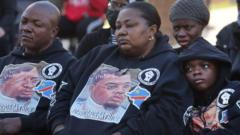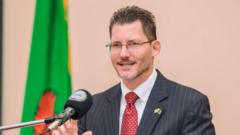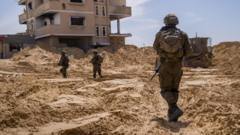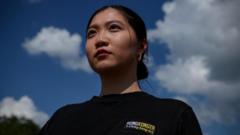As Serbia experiences economic growth exceeding the European average, President Aleksandar Vucic's administration is plunged into turmoil, with widespread protests led by students illuminating a growing disenchantment with the government's leadership. Despite low unemployment rates and rising wages, many citizens, including older Serbs, are voicing grievances about corruption, inflation, and perceived government autocracy. This unrest reflects a deep socio-political divide in the country, casting a shadow over its economic achievements.
**Serbia's President Faces Unprecedented Political Crisis Amid Economic Growth**

**Serbia's President Faces Unprecedented Political Crisis Amid Economic Growth**
In a time of economic prosperity, President Aleksandar Vucic of Serbia grapples with mounting discontent from citizens amid nationwide protests.
Serbia's authoritarian leader should be basking in the glow of impressive economic growth that outpaces the rest of Europe. Unemployment is declining, wages are on the rise, and the nation appears to be thriving on the surface. However, President Aleksandar Vucic finds himself at the center of a storm, facing three months of intense street protests that have led to his greatest political challenge in over a decade of governance.
These protests are spearheaded by students in affluent urban centers such as Belgrade, who have demonstrated an astonishing unwillingness to accept government measures aimed at pacifying dissent. In a notable response to the protests, the government proposed offering state-subsidized loans of up to $100,000 to assist young people in purchasing apartments. The student leaders, however, rejected this proposition outright, stating, “Keep your money.”
In a further evolution of the protests, more marginalized individuals, like older Serbs, have joined the movement. These citizens previously supported Vucic’s regime due to government investments in local infrastructure and community facilities. However, their patience has worn thin. As jubilant students marched towards Novi Sad last week, Dusko Grujic, a local farmer, openly supported their cause, voicing skepticism about the government’s claims of a strong economy. While he acknowledged high food prices and limited financial security, his primary grievances revolved around widespread corruption, oppressive governance, and an alarming tendency for officials to dismiss criticism as the work of foreign adversaries.
This complex mixture of socio-economic conditions and fierce anti-government sentiment highlights the underlying tensions in Serbia today. While the government's narrative champions impressive economic indicators, the reality for many citizens is starkly different, suggesting a precarious balance between prosperity and political stability in the region.
These protests are spearheaded by students in affluent urban centers such as Belgrade, who have demonstrated an astonishing unwillingness to accept government measures aimed at pacifying dissent. In a notable response to the protests, the government proposed offering state-subsidized loans of up to $100,000 to assist young people in purchasing apartments. The student leaders, however, rejected this proposition outright, stating, “Keep your money.”
In a further evolution of the protests, more marginalized individuals, like older Serbs, have joined the movement. These citizens previously supported Vucic’s regime due to government investments in local infrastructure and community facilities. However, their patience has worn thin. As jubilant students marched towards Novi Sad last week, Dusko Grujic, a local farmer, openly supported their cause, voicing skepticism about the government’s claims of a strong economy. While he acknowledged high food prices and limited financial security, his primary grievances revolved around widespread corruption, oppressive governance, and an alarming tendency for officials to dismiss criticism as the work of foreign adversaries.
This complex mixture of socio-economic conditions and fierce anti-government sentiment highlights the underlying tensions in Serbia today. While the government's narrative champions impressive economic indicators, the reality for many citizens is starkly different, suggesting a precarious balance between prosperity and political stability in the region.




















